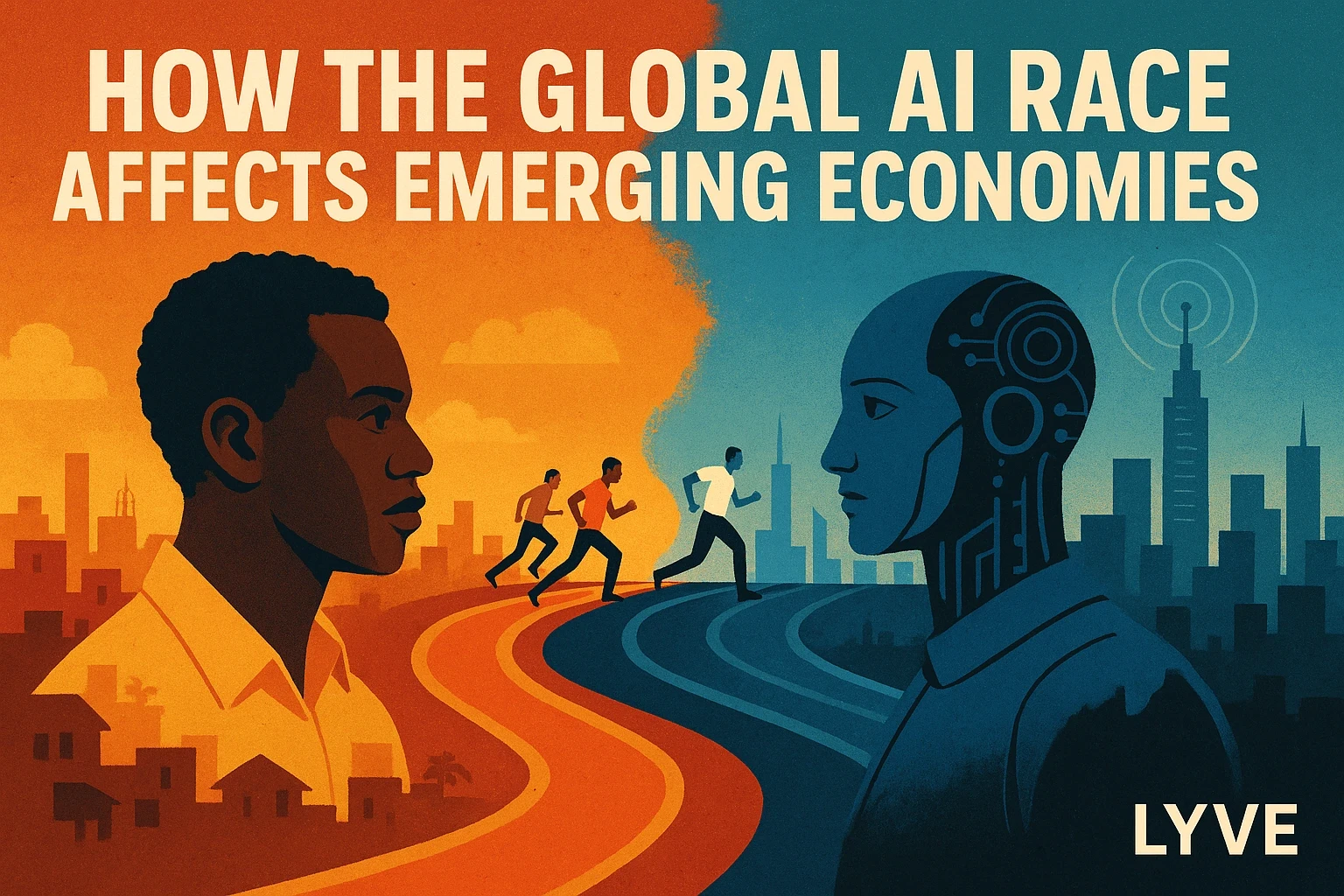Why the tech gold rush could widen — or close — the gap.
This is LYVE Originals — where Africa’s future gets a voice.
A Race Without a Level Track
Some call it the “Space Race of our time.”
Except this one isn’t about rockets or footprints on the moon — it’s about code, capital, and who gets to train the smartest machines.
The AI giants are already sprinting. Silicon Valley, Beijing, London… they have billion-dollar labs, elite engineers, and oceans of data.
Meanwhile, in Accra, Nairobi, Lagos? We’re still playing catch-up — dealing with patchy broadband, hesitant policies, and datasets that barely know our names, let alone our languages.
It’s not just a gap. Some days it feels like a cliff.
When You’re Not Even in the Starting Blocks
Earlier this year, I dropped by a co-working space in Kumasi. A young AI team was trying to train a model for Twi, Ewe, and Ga. Bright minds, caffeine-fueled nights, the whole startup energy. But their GPU? One rented cloud instance that kept throttling mid-run.
Meanwhile, OpenAI burns through more compute before lunch than that team could in a year.
Here’s the uncomfortable part:
- The AI shaping our next decade is being trained far away from our realities.
- The rulebook is being written without our pen on the page.
- And by the time these tools hit our shores? We’re paying subscription fees to use what our own data helped build.
How the Race Lands on Emerging Economies
Forget the glossy conference speeches. This is how it really plays out:
-
Data Leaves, Value Doesn’t Come Back
From Facebook posts to health surveys — our information is scooped up, fed into models, and monetised elsewhere. -
Talent Export, Problem Import
Yes, African engineers get hired. But often to solve problems for foreign markets, while local challenges wait their turn. -
Algorithms That Don’t “See” Us Right
When your training set is mostly Western or Chinese, you miss the context of an Accra street market or a Nairobi matatu stop. That can mean bad credit scores, bad translations — even bad policy advice.
Yes, There Are Wins
I don’t want to paint this as doom-only. There are bright spots:
- Kenyan farmers using AI-powered pest detection on their phones.
- Dakar shops automating bookkeeping and selling to overseas buyers.
- Health chatbots bridging gaps in rural clinics.
The problem? Most are donor-funded pilots, one server crash away from disappearing. Scaling them is the real battle.
Who Writes the Rules, Runs the Game
Policy here is moving at walking pace. But in the US, EU, and China, AI laws are already being drafted, refined, enforced.
And guess what — those frameworks often get imported wholesale into African markets. Whether or not they fit.
Sometimes, that means we’re following compliance checklists written for someone else’s risks… while ours remain unaddressed.
We’re at a Fork
Let’s be honest: we’re not matching America or China dollar-for-dollar. We don’t need to.
But we do need to make deliberate moves:
-
Regional Over Solo
ECOWAS pooling AI research funding. SADC creating an African AI data commons. If the EU can do it, so can we — but only if we stop treating each other like competitors for scraps. -
Own the Niches
We may not lead in general-purpose AI, but we can dominate in African language models, agri-tech, mobile money fraud detection. -
Open-Source as a Strategy
Build on open tools. Contribute back. Reduce dependency. This isn’t charity — it’s survival.
Why It’s Urgent
If we let this moment slip, the danger isn’t just “falling behind.”
It’s becoming permanently dependent — locked into systems we didn’t design, paying forever to use tools built on our own raw materials.
Our languages fade out of the digital world.
Our talent leaves, our problems stay.
And changing that later? That’s like trying to rebuild the road after the race has already finished.
Closing the Gap Means Seeing It First
I won’t pretend this is a neat ending. The track is tilted, the rules are skewed.
But that doesn’t mean you sit in the stands.
It means you find your lane, run with those beside you, and — if the track won’t take you — lay your own.
Because in this race, it’s not just about who’s fastest.
It’s about who chooses the direction.
P.S. You already see what’s coming — which means you’re the type we built LYVE+ for.
Not fluff. Not recycled press releases. Just sharp, context-rich analysis and the tools to move with it.
Join LYVE+ — because the future isn’t waiting.
Get More Tech Insights
Subscribe to our weekly newsletter for the latest in African technology innovation.
